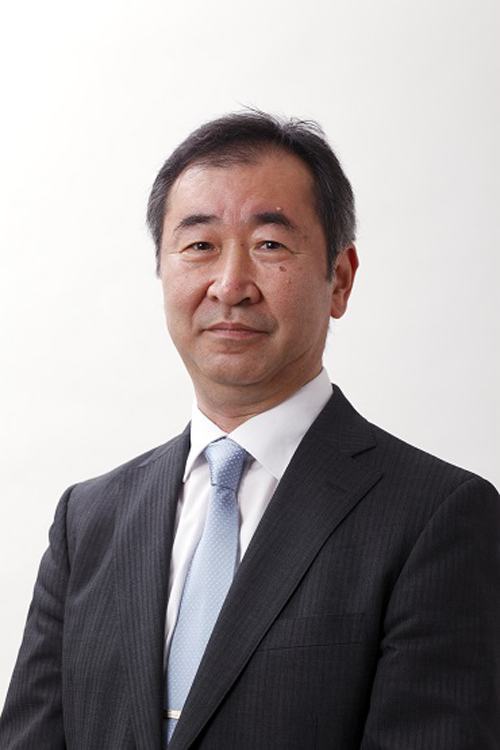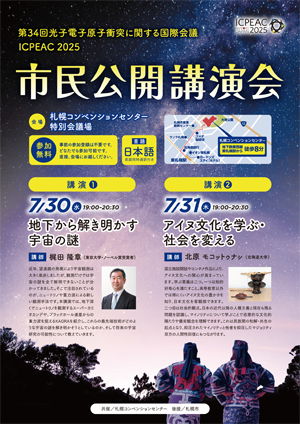Public Lecture
- Sponsored by
- Sapporo Convention Center
- Supported by
- Sapporo City
- Venue
- Conference Hall, Sapporo Convention Center
https://www.sora-scc.jp/eng/
- Language
- Japanese with simultaneous interpretation
- How to join
- No pre-registration is required. Please feel free to come directly to the venue.
Public Lecture 1
19:00-20:30, July 30th (Wed)
Unveiling the Mysteries of the Universe from Underground
- Speaker
- Takaaki Kajita (The University of Tokyo, Japan)
Abstract
In recent years, astronomical observations have advanced dramatically, leading to significant progress in our understanding of the universe. This remarkable progress has largely been driven by the development of increasingly sophisticated telescopes. However, as our knowledge of the universe has deepened, it has also become clear that telescopes alone cannot unveil all of its mysteries.
Observations using neutrinos and gravitational waves have emerged as powerful new tools in the quest to understand the cosmos. These messengers offer insights into phenomena that are invisible or difficult to detect through conventional electromagnetic observations.
In this lecture, I will introduce groundbreaking underground experiments such as Super-Kamiokande, which observes neutrinos deep beneath the Earth's surface, and KAGRA, which detects gravitational waves emitted by cataclysmic events like the mergers of black hole binaries. Through these observations, we are beginning to unravel new cosmic mysteries. I will also explore the kinds of questions these methods may help us answer in the future, and how they may reshape our view of the universe.

Public Lecture 2
19:00-20:30, July 31st (Thu)
Learning from Ainu Culture to Transform Society
- Speaker
- Mokottunas Kitahara (Hokkaido University, Japan)
Abstract
Interest in the Ainu people and Ainu culture is growing, as seen in the establishment of a national center for Ainu cultural research and promotion, as well as the recent popularity of entertainment works featuring Ainu as main characters. Learning about Ainu culture carries two important meanings.
The first lies in the intellectual value of cultural understanding. Whether learners are Ainu or non-Ainu, it remains difficult to obtain comprehensive information on Ainu culture without pursuing higher education. Thus, it is meaningful to take advantage of opportunities to study the culture, to appreciate its richness and value. Furthermore, by comparing Ainu culture with that of the majority Wajin (ethnic Japanese), one can gain a deeper understanding of Japanese culture itself. In Japan, it is not easy to study the majority culture from a perspective free from "Japanese exceptionalism" or "uniqueness." Observing Japanese culture through the lens of Ainu culture allows for an objective viewpoint and leads to new insights.
The second meaning is social. While we recognize racial discrimination as a form of injustice, there is a tendency to see it as a problem specific to Western countries, and thus, we often fail to consider it as our own issue. However, Japan has also incorporated racialist ideologies since the modern period, which have shaped both academic research and policy decisions, and these influences continue to persist in transformed ways today. Racialist research has historically attempted to “prove” inherent differences in ability between “races,” and recognizing the injustice of such efforts is a starting point for reconciliation and coexistence among different ethnic groups. This is also a key emphasis in countries leading in Indigenous policy.
By reversing the gaze, reexamining the culture of those who historically defined others as “racially different”, and by making comparative observations, we come to understand that the perceived cultural divide, the notions of "advancement" and "backwardness," were often arbitrarily constructed. In this way, learning about minorities not only serves to restore the humanity of those who were marginalized, but also helps the majority regain the humanity it lost through the act of marginalization.

市民公開講演会
- 共催
- 札幌コンベンションセンター
- 後援
- 札幌市
- 会場
- 札幌コンベンションセンター 特別会議場
https://www.sora-scc.jp/
- 言語
- 日本語(英語 同時通訳付き)
- 参加方法
- 事前の参加登録は不要です。直接、会場にお越しください。
講演1
7月30日(水) 19:00~20:30
地下から解き明かす宇宙の謎
- 講師
- 梶田 隆章(東京大学)
講演の概要
近年、宇宙の観測は大きく進み、それによって私たちの宇宙の理解も飛躍的に進歩しました。その原動力は望遠鏡の発展と言ってもよいかと思います。しかし、宇宙の理解が進むとともに、望遠鏡だけで宇宙の謎が全てわかるわけではないということもわかってきました。そして、ニュ-トリノや重力波などによる宇宙の観測が宇宙の謎を解き明かすうえで重要な役割を持つようになってきました。
本講演では、地下深くでニュ-トリノの観測をおこなっているスーパーカミオカンデや、ブラックホールの連星などから放出される重力波の観測に挑んでいるKAGRAなどを紹介し、これらの観測によってて宇宙のどのような謎が解き明かされようとしているのか、そして将来は宇宙のどのようなことが解き明かされるかなどを考えていきたいと思います。

講演2
7月31日(木) 19:00~20:30
アイヌ文化を学ぶ・社会を変える
- 講師
- 北原 モコットゥナㇱ(北海道大学)
講演の概要
国立のアイヌ文化研究・普及施設が開設され、アイヌ民族を主人公としたエンタメ作品が注目を集めるなど、アイヌ民族・アイヌ文化への関心が高まっている。アイヌ文化を学ぶことには2つの意義がある。
1つは、文化を学んで知的好奇心を満たすことである。学び手はアイヌであることも非アイヌであることもあるが、いずれにせよ今日では高等教育機関などに進学しなければ、アイヌ文化についてのまとまった情報を得ることは難しい。そこで、機会をとらえて文化を学び、その豊かさや価値を知るという意義がある。また、アイヌ文化と比較することで、日本のマジョリティ文化である和民族(いわゆる日本人)の文化を深く理解することにもなる。和民族について、日本例外主義・日本特殊主義的な観点によらずに学ぶことはやはり容易ではない。アイヌ文化を鏡として日本文化を眺めることで、客観的な視点をもち、新たな認識を得ることができる。
2つ目は社会的な観点からのものである。私たちは人種差別が不正義であることを知っている。いっぽう、人種差別は欧米圏に特有の問題と捉えがちであり、自分事として考える機会が乏しい。しかし、日本でも近代以降に人種主義を取り入れ、それに立脚した研究や政策を展開してきた歴史があり、その問題は今日でも形を変えて残っている。人種主義的な研究は「人種」間における絶対的な能力差を証明しようとしてきた。その不当さを改めて認識することが民族間の和解や共生の起点であり、先住民政策をリードする諸外国で重視されている点でもある。
また、他者を眺め、異人種として規定してきた者の文化を反対からの視点で眺め返し、改めて比較することにより、両者の間にあるとされた文化的な隔たり、「先進性」や「後進性」が、恣意的に捏造されたものであることを知ることができる。このように、マイノリティについて学ぶことは、抑圧されたマイノリティの人間性を回復することに留まらず、他者を抑圧することで失った、マジョリティ自身の人間性を取り戻すことにもつながる。



